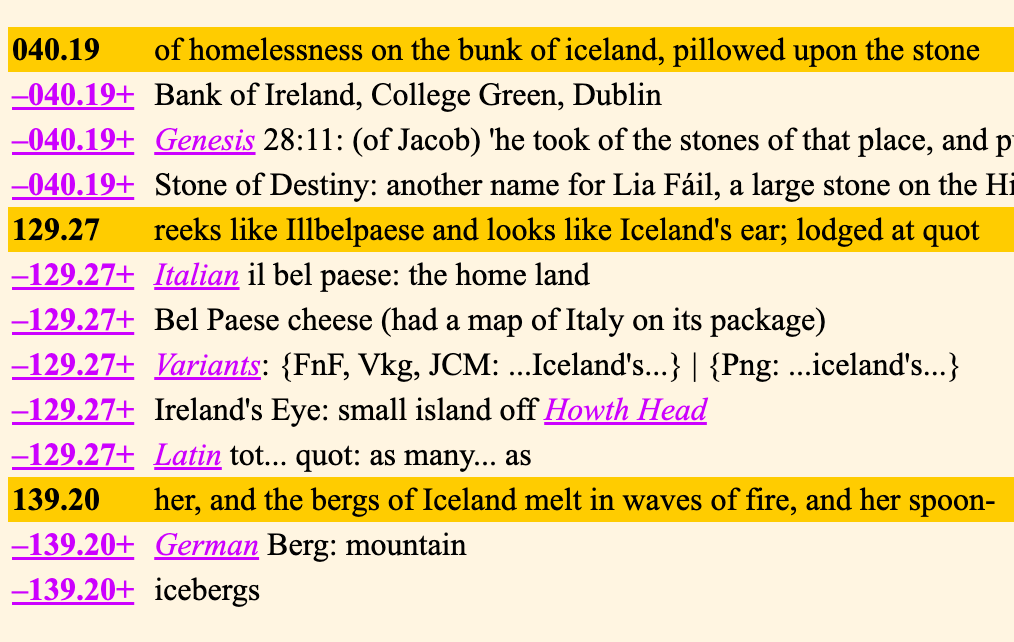The Bunk of Iceland
Bloomsday on an island (not Ireland, not the Is-land)
There was a time when I would have counted it very bad luck to travel anywhere on Bloomsday, let alone a storied island, without a copy of Ulysses, just in case. I am less superstitious now, less sentimental, less pretentious (for the most part), and also, crucially, far less inclined to lug heavy books around unless I absolutely have to.
This Bloomsday, early in the morning, I will stumble off a plane near Reykjavik, where my family and I will dither around for a few days before flying on to Europe. We’re packing for a long trip, and there’s no room for big books. It’s cheap to travel between Canada and Europe on Icelandair right now, because some folks are worried about volcanic activity on the island, and especially near the airport. We are not some folks! My kids are intent on seeing a bit of lava, or quite a lot, if they can. I am too, truth be told, although we differ substantially on how close to a lava floe is close enough.
Icelandair has only changed our flight once, and as I write, the road from the airport to Reykjavik, where we will stay, is open. The sun will set after midnight on Bloomsday and rise before 3am. This is dire news so far as jetlag management goes but it bodes well for troll avoidance. The small boys and I have together read many many pages of internet drivel devoted to Icelandic trolls and have gleaned that these trolls have a taste for mischievous children, whom they lure into their caves and eat uncooked. Folklore put to the timeless end of juvenile behaviour management. The hitch is that the trolls turn to stone in sunlight. Instead of taking a good behaviour pledge, my kids are resolved to stay indoors for the three hours of smeared darkness.
Iceland does not feature in Ulysses (nor do trolls or lava, I discovered thanks to this concordance). I was once a sort-of Joycean, but never the sort of Joycean who could summon textual references without the help of a concordance. It surprised me that there were no Icelandisms in Ulysses, as Ulysses is a book about islands and travel, and also about the ways books and language travel between islands, themes which to me seem to have a lot to do with Iceland. The first people I knew who travelled to Iceland weren’t going there take selfies against dramatic backdrops (Kyle Chayka writes a lot, not very convincingly, about Instagram-inspired travel to Iceland in Filterworld), they were students of Old English whose research had taken a turn towards the sagas and Old Norse. Very Joycean matter! It was pleasing then to discover at least a few punning references to Iceland in Finnegans Wake (again, thank you, concordance).

Somewhat dissatisfied, however, with the under-representation of Iceland in the oeuvre of James Joyce, and also procrastinating, I kept poking around online to see if anyone had written about Joyce and Iceland. Almost all of my Joyce books are in storage in Sydney, so I am at the mercy of the search engines. What I discovered, as anyone would if they used ‘iceland in ulysses’ as a search term, was that even though there is precious little Iceland in the work of James Joyce, several of his books have been translated into Icelandic, if only recently, by an Icelandic polymath, Sigurdur A. Magnússon, who has also translated a great deal of modern Greek poetry into the language of his small island. I learned a lot from this article by Ástrádur Eysteinsson on the Icelandic translation and reception of Joyce’s texts, and maybe if you plan to read one random bit of Joyce scholarship to celebrate Bloomsday, this should be it? And there I found too vindication of my sense that Iceland is a generative site for reading Joyce. Eysteinsson writes of Magnússon:
It is somehow appropriate that he should be the one to transfer Joyce’s modern Irish odyssey to the even more northerly shores of his native island. In fact, both Ireland and Iceland can be seen as further locations or dwelling points in the Homeric adventure – a vital thread in literary history, but more specifically in the literary history of the two islands. Instead of accepting the Latin “Ulysses” as an international or pan-European designation, Magnússon opted for the Icelandic version of the original Greek as a title for his Icelandic version: Ódysseifur, which for Icelandic readers creates a strong link to the 19th Century Icelandic translation of the Odyssey, that is, Odysseifskvida by Sveinbjörn Egilsson, whose renderings of the Homeric epics are among the most important translations in the Icelandic language.
I now understand these detours and digressions to be part of what it means to be a Joyce reader, rather than a distraction. Gabrielle Carey was one of the best Joyce readers, someone who treated the books as living things, profane and marvellous, and read them with the ambivalence and prevarication that is their due. I send Bloomsday love to her friends, especially those who were part of her legendary reading groups, and recommend her beautiful essays on Joyce, including this one on the Wake. It’s about ten years since I’ve read Ulysses cover to cover and I reckon I’m about due another go – but not on this trip.
I haven’t been diligently making my way through a curriculum of modern Icelandic literature over these past few months either. Those Sjón novels are still waiting for me, along with much else. Tis valiant and noble to die with several shelves of unread books etc etc. I did manage to read this excellent recent review by Michael Hofmann of a biography of Halldór Laxness, which has put both the bio and Laxness’ work on the buckling TBR shelf; Hofmann writes:
Like the inhabitants of other small and remote countries, the Icelander has the choice to go or stay. Laxness did both. He was a cosmopolitan and a homebody. He yo-yoed. He stayed in Iceland and he left. The Gullfoss, a passenger ship that trafficked between Iceland, Europe and America, seems to pop up every few pages in this biography; it must have felt like a second home to him.
In 2017 the NonfictionNOW conference was held in Reykjavik. I was nursing a small baby then, and watched with some jealousy as a legion of Australian writers jetted off to workshop their essays and sup of the wisdom of the global denizens of quote unquote creative nonfiction. Ultimately though I was a beneficiary of this conference as two writers whose work I always read, Vanessa Berry and Fiona Wright, wrote essays rooted in their Iceland trips. Letter from Iceland and A Regular Choreography both appeared in the SRB in 2017.
I’ll be toggling between holiday and work mode for the next two months, mainly based in France. I plan to read and read and read, mainly for pleasure. In lieu of a bag of books I will stow a heavily loaded e-reader. If I must encounter in print an epic twentieth-century reimagining of the already-mythologised past, if I really must hold a large book in my hands, I will filch the omnibus edition of The Once and Future King by T.H. White that my son has stuffed in his backpack. If you happen to be excited by the convergence of Arthurian legends and the heyday of the BBC Radiophonic Workshop, then I recommend listening to this 1981 radio play based on The Sword in the Stone. Yes, precocious children almost get cooked up by a witch in a cauldron, but in Iceland, they get eaten by trolls.
Thanks for reading Infra Dig! Subscribe for free to receive new posts and support my work.


